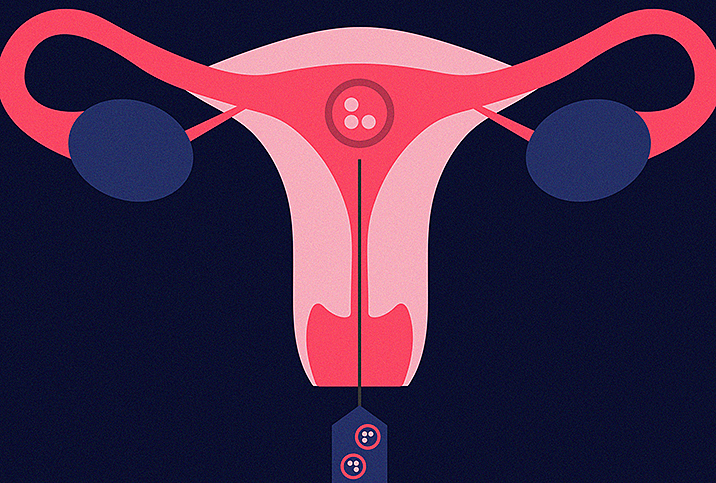You Have Bladder Cancer—Here's How to Protect Your Fertility

Perhaps you noticed your urine was an off-color—orange or pink—and peeing caused you pain. Initially, you thought you had a bladder infection or maybe a kidney stone. But what you didn't expect was for your doctor to diagnose you with early-stage bladder cancer. Luckily, when caught early, bladder cancer has a high rate of survival. And while most bladder cancer occurs in people over age 65, it can occur in the reproductive years. Bladder cancer is more common in men than in women but may affect fertility in both.
Stages
Bladder cancer that hasn't invaded the bladder muscle is categorized into two groups. The vast majority of cases diagnosed in people under age 44 are in stage 0 or 1. Stage 0 is subdivided into Ta (noninvasive) and Tis (in situ). Both are made up of abnormal cells that may develop into cancer.
Stage 1 cancer, called T1, has formed and spread to the connective tissue next to the inner lining of the bladder.
Grades
Bladder cancer has a high rate of recurrence, but what this means depends on whether the cancer is low grade or high grade.
Low-grade bladder cancer (Grade 1) may recur after treatment but doesn't become invasive.
High-grade bladder cancer (Grade 3) is likely to spread, so it is treated more aggressively than a low-grade cancer of the same stage.
Risk
Noninvasive bladder cancers are divided into three risk levels:
- Low risk: A single, low-grade Ta primary tumor smaller than 3 centimeters in diameter.
- High risk: Any Tis tumors and high-grade tumors, and all T1 tumors. In addition, if you have multiple Ta low-grade tumors larger than 3 centimeters, it is high-risk.
- Intermediate risk: Anything in between low and high risk.
Treatment
For low-risk patients, the first line of treatment is transurethral resection of the bladder tumor (TURBT), a process that scrapes away cancer cells. This is followed by intravesical chemotherapy, bathing the interior of the bladder with the chemotherapy drug Mitomycin C to kill any remaining cancer cells. "Intravesical" is a term that means "happening in the bladder."
Intermediate-risk patients, after the TURBT and Mitomycin C treatments, will receive six weekly intravesical Mitomycin C or bacillus Calmette-Guérin (BCG) treatments, with follow-up treatments every three months for a year. (Interestingly, BCG is the tuberculosis vaccine.)
For high-risk patients, multiple TURBTs are done to ensure the removal of all visible cancer cells before the start of the Mitomycin C and BCG treatments. Another TURBT is performed several weeks later to determine if the bladder needs to be removed. If it does not, the patient will receive intravesical BCG treatments every three months for three years.
So how does all this affect your fertility?
For men, one small study suggests BCG (but not Mitomycin C) can decrease sperm count.
For women, none of the above treatments affect fertility: TURBT doesn't, and since the chemotherapy and BCG treatments are localized, they don't have a lasting effect on the ability to have children either. That said, neither BCG nor Mitomycin C has been studied for possible effects on fertility or in pregnant or breastfeeding women, and both come with the recommendation to not get pregnant or nurse while taking them. If you are undergoing the one- or three-year maintenance procedure with HCG, that is an unfavorable time to get pregnant since there isn't much recovery time between sessions.
If you need to have your bladder removed, it usually means you will have your ovaries, fallopian tubes, uterus, cervix and part of your vagina removed as well.
So what can you do? Make a Plan B. Before you start treatment, talk with your doctor about freezing your eggs or sperm. Freezing sperm is a simple process, but take into account that freezing eggs may delay your cancer treatment for a few weeks while they harvest your eggs. You could consider freezing embryos if you make a quick decision about how to fertilize them. Besides providing a way for you or your partner to carry a pregnancy, these actions could allow you to hire a surrogate to carry your child.


















